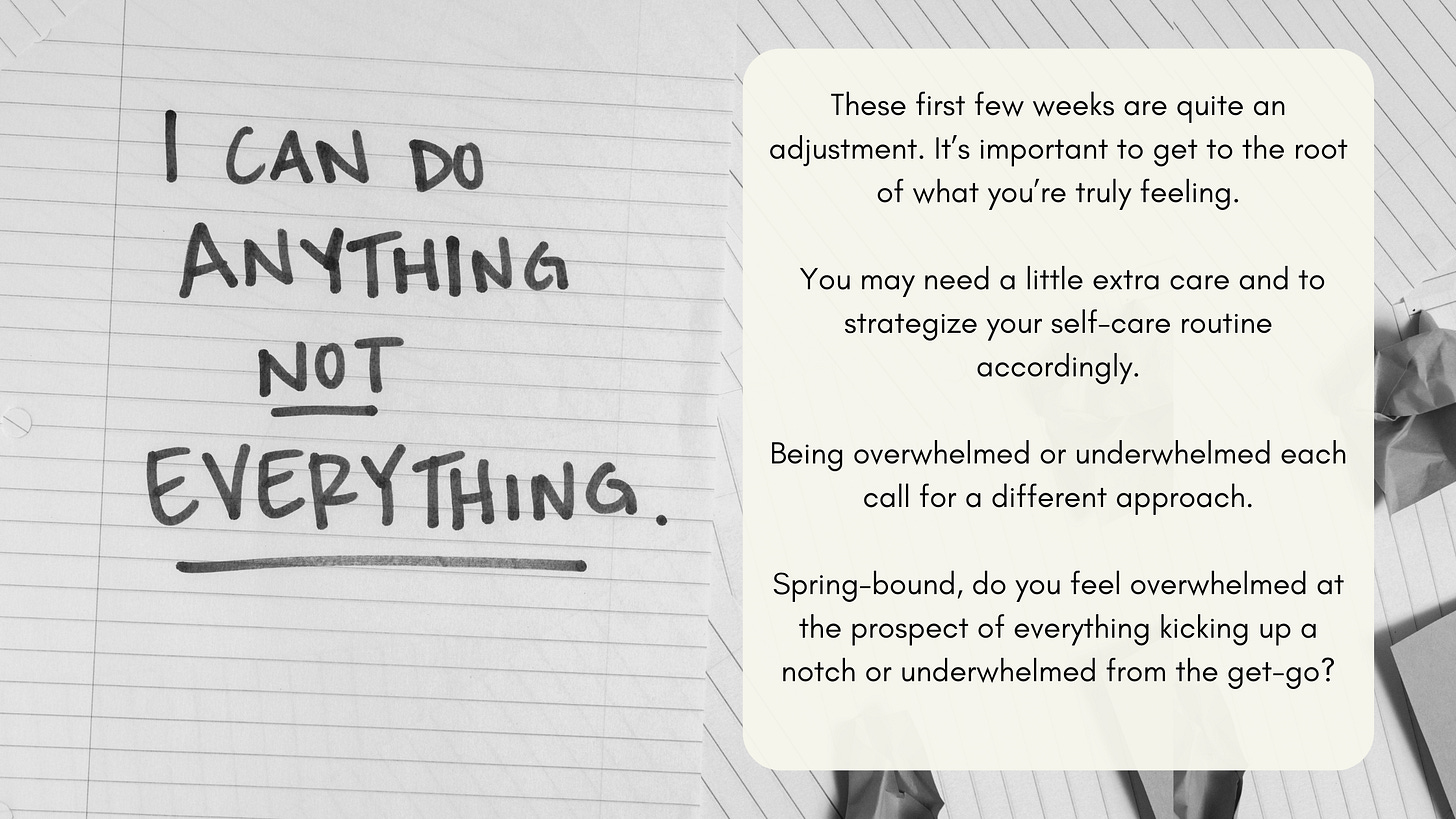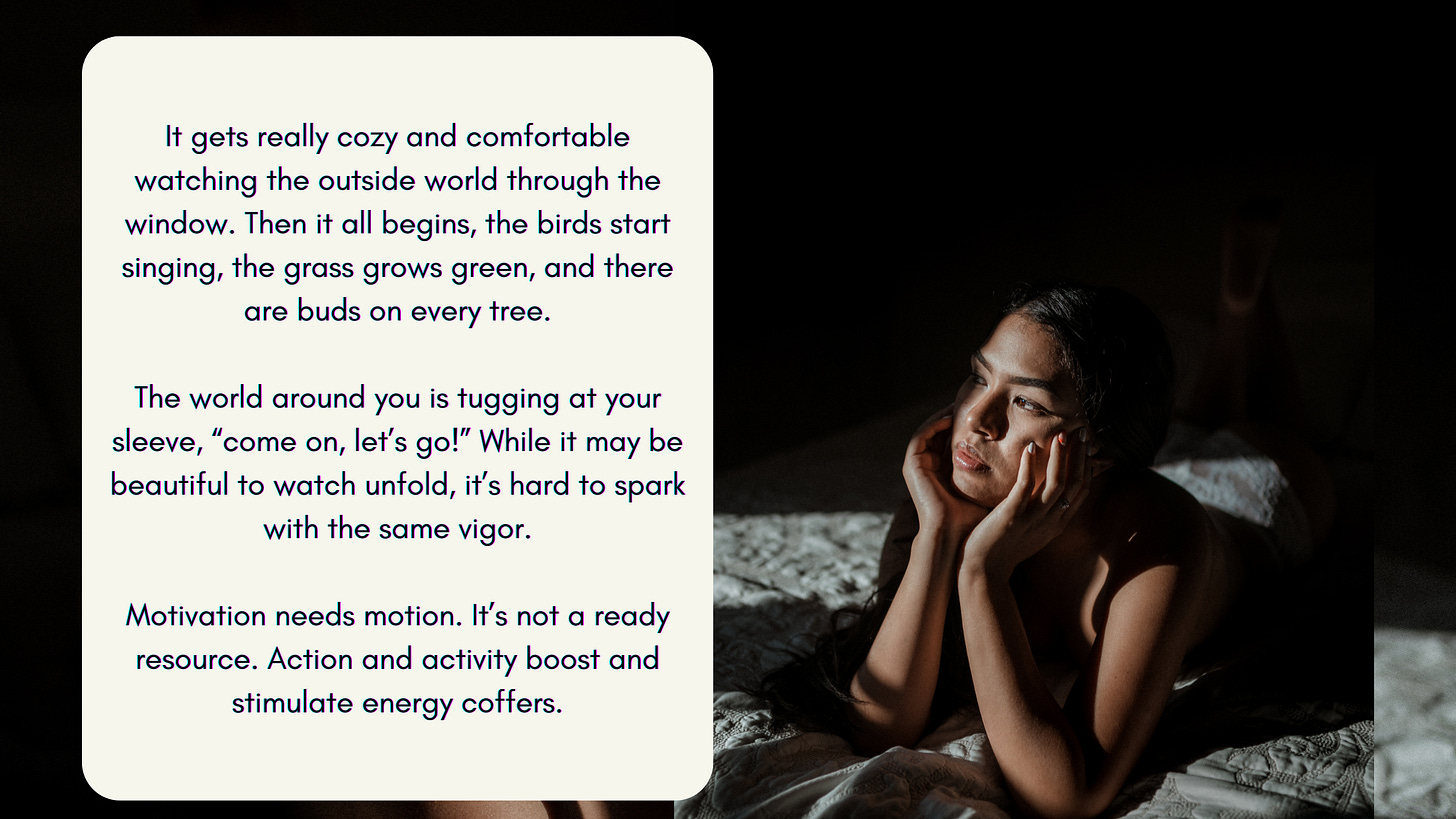Spring Awakening, Be real with your Feels
Managing Overwhelm and Underwhelm, key strategies for your mental health.
Spring has sprung. How do you feel? There is definitely a big shift in energy every spring. For those of us living in places that transition through four very different seasons, spring can be the most chaotic. One day you are skipping through fields with the sunshine on your face; the next, you're loading the woodrack, wondering if this will be the last fire of the season. Even if April showers bring May flowers, sometimes you look forward to any window without forecasted rain. On fluctuating calm or gusty days, the wind is just as taxing and fickle.
Traditionally in Ayurveda, Spring is said to be the Kapha season with her heavy earthy vibes. There is a prevailing sense of excitement as spring fever comes on, but for some, it can take a while to shift gears. Our circadian rhythm takes some time to adapt to longer days of light. Spring fatigue can settle in for a few weeks while our serotonin levels amp up and our melatonin drops. With too many months of stagnation and not enough stamina, we tend to wear out quickly.
These first few weeks are quite an adjustment. It’s important to get to the root of what you’re truly feeling. You may need a little extra care and to strategize your self-care routine accordingly. Being overwhelmed or underwhelmed each call for a different approach.
Spring-bound, do you feel overwhelmed at the prospect of everything kicking up a notch or underwhelmed from the get-go?
S.O.S. - Spring Overwhelm Syndrome
Airy, expansive qualities of spring may space you out. Nature is catapulting us into full sensory overload. The mind goes into these lighter qualities making it hard to focus. You might find yourself in brainstorming session after brainstorming session as the creative ideas flood through. Like any overactive electrical outlet, eventually the circuit can trip. It’s easy to lose track of time with later sunsets and try to squeeze in just a few more things on our to-do list. Protect your sensitivities and slow your roll.
Seek solace. Stand still on terra firma and ground. The nervous system may need some soothing self-care strategies to nourish an overactive mind.
Rest: Honor any feelings of fatigue. Try taking a break if you feel run down. A 20-minute guided relaxation in Savasana will give you a much-needed boost. Rest your senses when you feel overstimulated; find a quiet place, close your eyes, and listen to the gentle whisper of the breath roll in and out, like the waves of the ocean.
Massage (Abhyanga): Use warm sesame oil to nourish your skin and temperament. Start at your feet and work your way up toward your heart. Give a few extra minutes at the abdomen, move clockwise in a circular motion from left to right. Include your hands, arms, shoulders, throat, face, and head. Spending some time on the scalp. Do this every day or minimally 2-3 times a week. Let it soak in for a few minutes at least, then take a shower.
Warm soak: Climb in the tub for a soothing bath. Add a few drops of essential oils. Use earthy, woody scents to ground and floral notes to nourish. Try geranium, lavender, neroli, or rosewood. Tend to variable appetite: Keep a routine around eating, even if you notice you're not especially hungry. During the daylight hours, try not to skip meals. Consider trying four small meals, rather than three big ones, if digestion is weak.
Cook with gently warming spices: Black pepper, Cumin, Ginger powder, Cinnamon, Saffron.
Replenish your vitamins and minerals: Favor flavor profiles of Sweet (root vegetables, ghee, dates) Sour *in moderation (lime juice, pineapple, miso), and Salty (Himalayan pink, seaweed, celery) foods. Avoid pungent and astringent
Hydration for the brain: Set a goal for daily intake of water that equals to half your body weight in ounces. (ex. 160lbs = 80 ounces of water) Seventy-five percent of the brain’s mass is water. When we get dehydrated, the brain shrinks in volume. Moderate dehydration can lead to an overall spaciness with episodes of brain fog, lack of focus, and confusion. According to Hilary Bethancourt Ph.D., even with a mild dehydration of 1% - cognitive function decreases 5%.
Yoga Poses: Warm up joints and choose stabilizing poses. Steadily build strength. Keep the flow slow or choose static poses like Warrior, Supported Forward Bend, and Legs up the Wall. Practice with the intention to restore the nervous system and nurture the heart.
Journal: Ideas flowing? Get them on paper. Experiencing a lot of emotion? Write out what you're feeling. Rather than spin thoughts around in your head, journal about whatever is draining mental energy. This can be the first step to a resolution process and can release a need to over-analyze.
Evening Routine: Focus your self-care strategies in your evening wind down. Give time to transition from the business of the day to the calm of the evening. All of those luxurious skin care routines won’t only nourish your skin, but will signal to your body that it’s almost time for bed. Taking this time may help with any tendencies of insomnia as you slowly retreat from mental and physical activity.
Master Motivation: Ditch Underwhelm
The weather begins its shift very slowly from the cold and heaviness of the winter months. Once we get through the holidays, we may hibernate on the couch for most of January and February. Unless you enjoy bundling up for adventures outside, you probably spend a lot of time indoors. It gets really cozy and comfortable watching the outside world through the window. Then it all begins, the birds start singing, the grass grows green, and there are buds on every tree. The world around you is tugging at your sleeve, “come on, let’s go!” While it may be beautiful to watch unfold, it’s hard to spark with the same vigor.
It can feel a bit clunky when shaking off the sluggishness. Motivation needs motion. It’s not a ready resource. Action and activity boost and stimulate energy coffers.
Dry Brushing: It's a great way to remove dry skin and rejuvenate the body with a gentle detox. Its stimulating effect encourages lymphatic drainage and increases circulation. Use a body brush with soft natural bristles. Start at the extremities taking long strokes as you brush towards the heart. You can do this just before showering. Follow with a safflower oil abhyanga massage for a little luster.
Neti pot: Springtime is known as the allergy season. Mucus and congestion can really keep you from feeling fully charged. Use a neti pot each morning to clear away mucus, dust, and allergens. You can get one of these little teapot-looking gadgets at any pharmacy these days!
Cook with heating spices: Turmeric, Coriander, Cardamom, Mustard Seed, Chili powder, and Cloves.
Tend to slow digestion: Check your energy odometer, if you feel sluggish after every meal - it’s an indication that you may want to lighten up on what you're eating. Plan meals that are less oily and heavy as you shift out of the winter.
Replenish your vitamins and minerals: Favor flavor profiles of Pungent (radishes, chilis, and garlic), Bitter (kale, dandelion greens, arugula), Astringent (black beans, broccoli, pomegranate) foods. Avoid sweet and sour foods.
Yoga Poses: Build some heat and sweat it out. Go for some uplift yoga sculpt to bring in cardio and weight training. Try some heart opening poses to release congestion from the chest and head. Flow for a more invigorating yoga practice to stimulate circulation with poses like: Bridge, Plank, Warrior poses, Fish, and Boat pose. Practice with the intention to rejuvenate and activate.
Morning-routine: Rise and shine. Highlight your morning routine. Begin the day’s self-care with exercise. Get moving early between 6 am - 10 am. Counter any lingering lethargy with a brisk walk. It will fire up motivation and inspiration for a great start to the morning. You’ll feel productive before breakfast. It’s a big win that will propel you into the rest of the day.
List goals and To-dos: Get specific on your goals for the week. Jot them down. Set up your to-dos. Try the 1-3-5 method to prioritize one major task, three medium-sized tasks, and five little ones for each day. We get a hit of dopamine with each accomplishment and that feeds the motivation to keep moving forward to the next thing.
Ayurveda has always recognized the transition from winter to spring as the most vulnerable period for our physical and mental wellness. Our systems are fragile as we adjust to a drastic change in our circadian rhythm, often too we experience a deficiency in essential vitamins and minerals. Beyond measures to support our physical body, this is a pivotal time for mood and mind medicine.
What I have been most surprised to learn in reading studies published by the national library of medicine is there is real evidence of many mental health disorders peaking during spring. Episodes of mania and depression heighten. Suicide statistics surge from April to May. The “why” is inconclusive. Researchers believe everything from inflammation due to allergens to prolonged winter isolation have an effect on our mental wellness this time of year.
We have our own unique elemental design and in that, we are impacted by our surroundings and relations. Even as the birds are chirping, you aren’t alone if you notice a change in your mood or mental outlook. Know that. Also, know it’s time to take care. Elevating your self-care strategies will reconnect you to yourself. From there you’ll recalibrate to a steady rhythm and find your flow again.
If feelings of overwhelm or underwhelm start to linger, reach out for support. Talk to a friend, make an appointment with a therapist, or call the mental crisis lifeline at 988.








